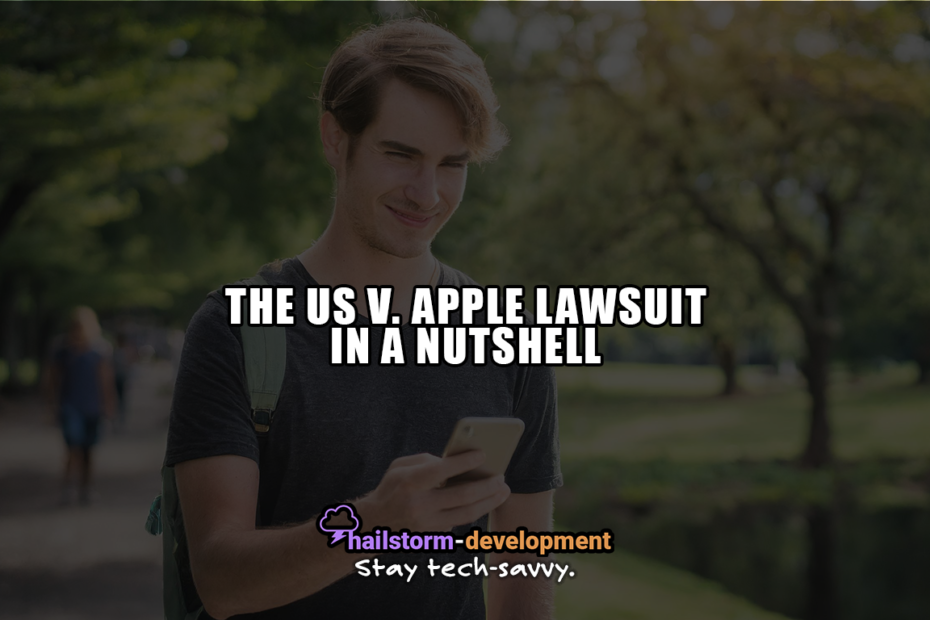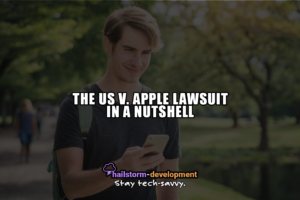The United States v. Apple Lawsuit
It’s official: the US v. Apple 88-page complaint from the US Department of Justice (DOJ) details how the tech giant’s behavior historically has negatively impacted the lives of American citizens. For instance, they illegally maintained a smartphone monopoly by imposing contractual restrictions on developers. Further, the organization “undermines apps, products, and services” that could lead to less use and reliance on the iPhone. Though these are just two brief examples of bad acting, they make it abundantly clear Apple has crossed the line legally time and time again.
What was Epic v. Apple?
In 2020, Epic filed a complaint arguing that Apple monopolized the market for app distribution and payments on iPhones by enabling developers to use a second product (In-App Purchase) for in-app sales of in-app content. This was in response to Apple banning it from the App Store after implementing its own payment system for Fortnite’s virtual currency. However, Epic fell flat and lost a majority of its claims. It’s worth noting that although both Apple and Epic appealed the case, the requests were denied, and the case remains closed, with Apple the not-so-official winner. Apple was ordered to allow links and other calls to action that would bypass Apple’s payment system, but that hasn’t happened yet.
Some of the Key Issues
There are several ways the DOJ highlighted how Apple has, allegedly, illegally maintained its monopoly:
- Blocking cloud-streaming apps: Apple prevented developers from offering cloud gaming apps that reduce dependence on the iPhone’s expensive hardware
- Suppressing the quality of messaging between the iPhone and other platforms like Android
- Limiting the functionality of third-party smartwatches, making it harder for Apple Watch users to switch from iPhone
- Blocking third-party developers from creating competing digital wallets with tap-to-pay functionality for iPhone
- Super apps: Apple prevented apps from threatening its smartphone monopoly by undermining mini programs that reduce user dependence on the iPhone
Do We Chalk It Up As a Win?
Though the US v. Apple lawsuit has received praise from experts in the antitrust field, particularly about how Apple’s behavior causes both consumer and developer harm, it won’t be that cut and dry in the courtroom. Even if the judge rules that Apple is an illegal monopoly, effectively remedying the solution is another monster.

What the DOJ Has to Say About the Apple Lawsuit
In the complaint, the DOJ states that Apple’s conduct harms the competitive process. Not only that but also they employ incentives to use its monopoly playbook through many other products and services. They highlight the only two companies (Google and Samsung) that are meaningful competitors in the smartphone market. Thus, smartphone users are left with fewer choices. According to user surveys, iPhone users are less likely to switch to an alternative due to cross-platform issues like messaging.
In Conclusion
For over 100 years, the DOJ has enforced antitrust laws against illegal monopolies by deploying the Sherman Act to unfetter markets and restore competition. As outlined in the complaint, the Department seeks relief on behalf of the American public due to Apple’s long-running, pervasive anticompetitive conduct. Want to learn more? Click the button below to read the official complaint.
Resources & Further Reading
Feiner, L. (2024, March 21). US sues Apple for illegal monopoly over smartphones. The Verge. https://www.theverge.com/2024/3/21/24105363/apple-doj-monopoly-lawsuit
Jeong, S. (2024, March 22). United States v. Apple is pure nerd rage. The Verge. https://www.theverge.com/2024/3/22/24109168/us-doj-apple-antitrust-complaint-nerd-rage
Justice Department sues Apple for monopolizing smartphone markets. Office of Public Affairs | Justice Department Sues Apple for Monopolizing Smartphone Markets | United States Department of Justice. (2024, March 21). https://www.justice.gov/opa/pr/justice-department-sues-apple-monopolizing-smartphone-markets
U.S and plaintiff states v. Apple Inc.. Antitrust Division | U.S and Plaintiff States v. Apple Inc. | United States Department of Justice. (2024, March 21). https://www.justice.gov/atr/case/us-and-plaintiff-states-v-apple-inc
Recent Posts
Quick Guide to Google Search
What’s New in Google Search? If you own a business,...
Read MoreMicrosoft Edge’s New RAM Slider
What the RAM Slider Will Do Twitter (now X) user...
Read MoreThe US v. Apple Lawsuit in a Nutshell
The United States v. Apple Lawsuit It’s official: the US...
Read MoreThe Best Tech Memes of 2023
20+ Funniest Tech Memes of 2023 In this post, we’ll...
Read More



